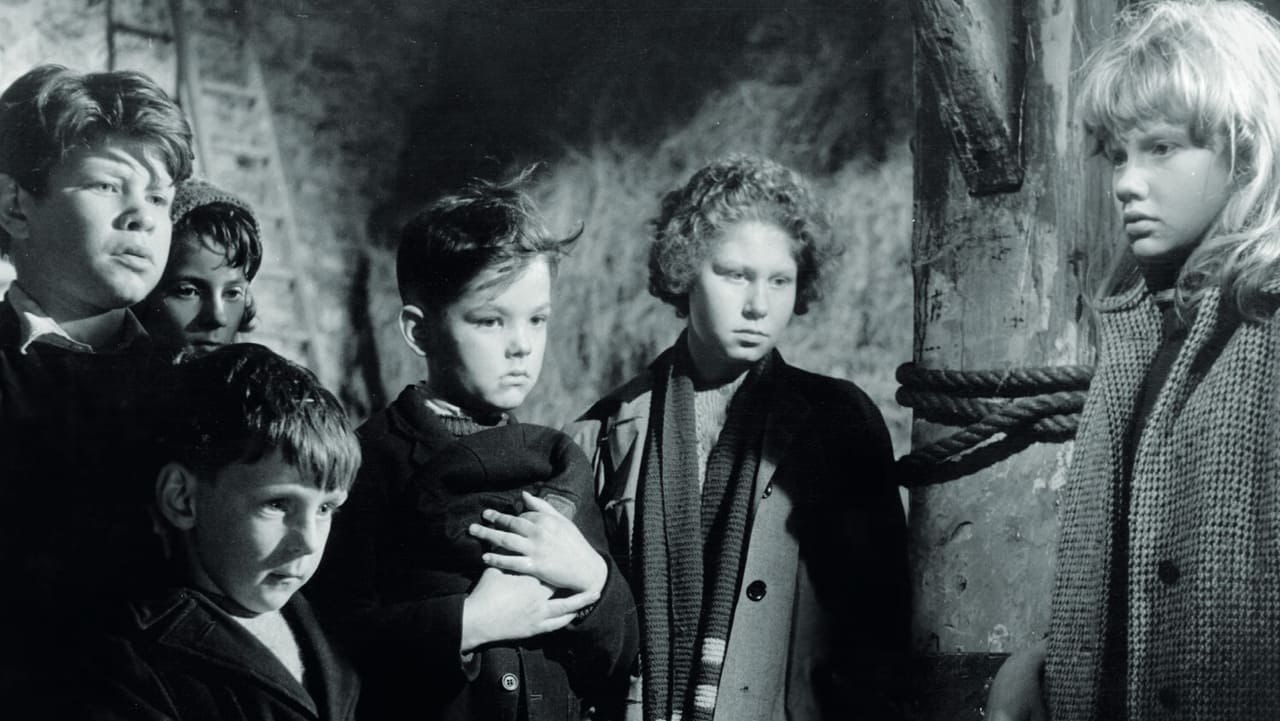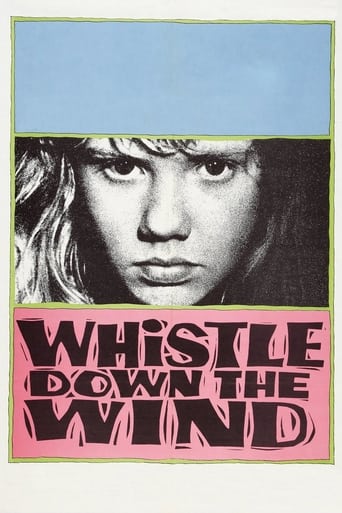

I am only giving this movie a 1 for the great cast, though I can't imagine what any of them were thinking. This movie was horrible
... View MoreI enjoyed watching this film and would recommend other to give it a try , (as I am) but this movie, although enjoyable to watch due to the better than average acting fails to add anything new to its storyline that is all too familiar to these types of movies.
... View MoreThe film may be flawed, but its message is not.
... View MoreIt's the kind of movie you'll want to see a second time with someone who hasn't seen it yet, to remember what it was like to watch it for the first time.
... View More"Whistle Down the Wind" is a lovely, moving film about the simple faith of children.A murderer on the run (Alan Bates) is found in a barn by some children, who come to believe the fugitive is Jesus Christ. This is all because the Bates' character, surprised by the kids, exclaims "Jesus Christ!", unaware that the children have asked him who he is.The unfailing conviction of the children is a beautiful thing to watch. The adults are all cynical. The parents are suspicious. At one point, the children seek out advice from a priest, who is but a blubbering fool. The kids soon realize that he knows nothing.It's a very simple story told extremely well. This may be one of the young Hayley Mills' best performances. Her unwavering belief in her Jesus drives the story.The end of the film finds the Bates' character hauled away by the police. But this only strengthens the children's belief that he was Jesus. This film is never "preachy". There are some fine comic moments. In one scene, the children beg "Jesus" to read to them, and Bates starts reading from a pulp magazine from the period, a soap opera about a certain "airline hostess". The children listen intently, but they wanted to hear biblical stories all the same.The film honestly answers the question: "What would happen if Jesus came back?" He'd be jailed, possibly crucified all over again.The boy playing Hayley Mill's younger brother is the only one who's faith is shaken at the end. When "Jesus" fails to save the boy's dying cat, the young man comes to realize that the Bates' character is not Jesus. "He's just a fella", says the boy, sounding like Judas Iscariot.The soundtrack features a very simple lovely childhood tune, which becomes an anthem to the children's simple belief.This is a rarely seen film and it seems as if it's been all but forgotten. Not a flashy movie by any means. I'm thinking how wonderful the Deborah Kerr film "The Innocents" is. I don't know if these movies are discarded simply because of future generations that refuse to watch black and white films. But I consider "Whistle Down the Wind", along with "The Innocents" a real treasure of British cinema.
... View MoreWhat creates the terribly poignant mood of this movie is the continuing contrasts between Christian teaching and acts, right from the beginning, when the little boy asks the Salvation Army lady if she will take care of the unwanted kitten. She fobs him off with "Jesus will look after it," which of course is worse than useless because it gives the child false hope and makes him feel that loving Jesus is useless too. Couldn't she have made SOME effort to find someone to care for the kitten instead of dispensing vapid promises of universal love? When Hayley Mills asks the Sunday-school teacher what would happen if Jesus came again, the teacher keeps avoiding the question and, when Mills asks, Would they do to him what they did before? is told, they might, because there are still bad people.As the film shows, the adult world is composed of some people who are bad and many others who are thoughtless and insensitive and have no trouble with saying one thing and doing another. They tell the children to be good but are themselves mean-spirited, harsh, and cruel, and would see no conflict between the two. The Hayley Mills character is so touching because she is just reaching the age at which children stop taking things literally and start turning into adults. We want her to believe that the murderer is Jesus, even though it is a lie, because the "real" world she lives in is so soulless.Perhaps the most troubling scene is the one in which the local bully, a boy not much older or bigger than the other children, knocks one little boy down and twists his arm while all the others stand and watch. Why do none of the others interfere? Just a few of them could overcome the bully. Hayley Mills arrives, and the bully hits her. She does not fight back, or even react--one must assume because she knows none of the others would help her. These children go to Sunday school, but they just watch, as if they had no sense of right and wrong, only the law of the jungle. They have, in a sense, become adults already--the ones we read about all the time who stand and watch someone being attacked and do nothing.
... View MoreOnce in a while you come across a film that is perfect - and this film is one of them. It has everything - humour, pathos, skilled acting, beautiful cinematography and it deals with the deepest questions of human existence. I found myself alternating between laughter and tears. It seems to touch on deep themes which films rarely dare to nowadays - themes of belief, faith, and the meaning of love.The photography of the bleak Lancashire countryside is superbly crisp, the facial expressions of the actors (especially Mr Bates) let us know exactly what is going on in their minds but subtly, in a way that is never seen nowadays in films where everything must be made explicit.The children interact entirely naturally and they are not merely credulous, but curious and questioning ('he's not Jesus, he's just some fella'). Some scenes are deeply moving, in particular when the children dance under a tree to the music of 'We Three Kings' in joy and praise at seeing what they believe to be their Saviour - seeming to sum up the deep, almost pagan connection between religion and the English countryside.The film deftly deals with the changing England of the time. By the early sixties, mainstream Christianity had begun to lose its hold on the English people (this was the time of Bishop Robinson and the 'Honest to God' debate); the decaying, plundered church is representative of the decline in organised religion, juxtaposed with the 'true' faith of the children. The religious figures, however, are not pilloried as would be the case in most modern films - they are treated sympathetically. I particularly liked the look of awkwardness on the Sunday school teacher's face when she is asked a question about Jesus which she knows she cannot answer with any honesty, and which she clumsily sidesteps.In many ways the film is an elegy for a lost England - an England where children roam the countryside freely, where the nearest telephone is half a mile away, and where children live in relative material poverty but with strong familial love, where the simple pleasures of life are enjoyed - playing in the open air, having a birthday party at home, or reading late into the night. The film could not realistically have been made even just ten years later.
... View MoreI love this film and it can move me to tears. When Hayley Mills and her siblings (all of them yet to reach their teens) discover a man hiding in their family's barn, they jump to the wrong conclusion and think they have stumbled upon Jesus' second coming. This is their secret and we are drawn into their world, in which adults are the enemy (after all, look what they did when Jesus last called...) and innocence rules. Of course, the story is highly allegorical and some of it is rather heavy-handed - the betrayal as the distant train whistle/cockerel crow is heard and the final 'crucifixion' scenes spring to mind, but overall it is a delightful 'little' film. I challenge anyone with childhood memories not to choke a little when the hundreds of local children come charging to the farm at the end. Marvellous all the way, this film - made just up the road from where I live - is a mini-classic, just what British film-makers of the period did best.
... View More